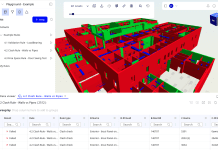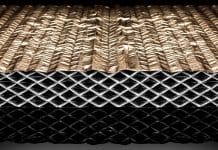The Raining’s Stairs development provides high-quality social housing that has helped transform a long-vacant site in Inverness city centre
It’s a project that could only be made viable by using offsite timber technology due to the steep and difficult site, which other developers had left alone. The development reinvigorates an important part of Inverness with a building of significant architectural quality and delivering profound, transformational benefits to the community.
It comprises five one-bedroom and 11 two-bedroom flats, a 70 sq m commercial unit, and cycle and refuse storage. Six flats are for affordable rent from the Highland Council and 10 flats are at a mid-market rent from the Highland Housing Alliance.
The development was built by a partnership between the Highland Housing Alliance, the Highland Council, developer Ark Estates, William Gray Construction and Trail Architects with a full timber kit supplied by Scotframe Timber Engineering. The project received funding from the Scottish Government as part of the City Region Deal.
The three main blocks have been carefully arranged, making the most of available space. The buildings step up the slope, with flats arranged over a total of six levels.
Background
The Raining’s Stairs housing project was completed in October 2018 and has been transformational to this corner of Inverness. It is named after the adjacent Raining’s Stairs, which connect the city centre to the Crown area and used to host a healthy mix of shops and housing but had fallen into decline since the 1970s. The site had become a blight on the city, becoming notorious for anti-social behaviour.
From the start, the design process was informed by collaborative relationships across a team which consisted of the Highland Council, the Highland Housing Association, the developer, contractor, architect and Scotframe Timber Engineering, who manufactured and supplied the structural timber kit that formed the main element of the project’s construction.
All parties worked together to successfully address their respective priorities and ensure the project was viable – particularly important given that several planning applications for this site had been granted over many years, but none were developed due to the complexities and constraints of the site. No one – until now – had been able to address the site’s issues well enough to make development viable.
The critical issues were the steep slope and limited access. Where previous proposals had provided several stairs and lifts within the buildings, this proposal focused on using the existing Raining’s Stairs to their full potential. This ensured there were fewer stairs within the buildings themselves, simplifying access and allowing most of the 16 flats to escape directly outside to ground level in the event of a fire.
The significant change in level on the site (27m) was handled by creating terraces to carry low level steel platforms, upon which the timber kit superstructure was placed. Offsite construction and prefabrication were employed as much as possible to simplify the construction programme on site.
The designs take into account the historic character of the area. The buildings have traditional pitched roof forms, so sit comfortably alongside neighbouring buildings, but the materials and detailing are contemporary. The use of lightweight materials in the cladding of walls and roofs creates a sharp, attractive façade that was also quick to install. The process was simplified further by installing window elements within the wall panels in the factory – reducing construction time and improving the building envelope, especially in relation to thermal performance.
There is already strong interest in the commercial unit – which is testament to the improving character of the location. As part of the project, a listed building that was derelict after a fire has been refurbished to a very high standard.
Use of offsite timber
Offsite construction and prefabrication were employed as much as possible at Raining’s Stairs to simplify the construction programme on site. The structural timber kit manufactured by Scotframe Timber Engineering was the main structural material.
Three terraces were created, one for each block, and on these terraces, low level steel platforms were constructed, upon which the prefabricated timber kit superstructure was placed. The development used factory assembled, pre-insulated timber kit panels, factory assembled timber floor cassettes and timber roof trusses. Windows were factory fitted in the panels by Scotframe Timber Engineering before delivery. This not only reduced construction time but also improved the building envelope, especially in relation to thermal performance. The closed panels used in this project provide a U-value of 0.17 W/m2K through the finished wall structure.
Timber has also been used as one of the cladding materials, along with aluminium and white render.
Site challenges
Raining’s Stairs was built on a particularly difficult site. The low part of the site is enclosed by buildings and access on the high side is limited to a small bottleneck. The significant changes in level and narrow nature of the site posed several challenges. For example, it was difficult to move heavy materials around, which would have made the use of masonry walls or tiled roofs problematic. The site is sloping and has no storage and very narrow access, making delivery of materials challenging as delivery times and dates were limited to ensure there was no impact on the surrounding traffic and car park.
Using an offsite structural timber kit allowed the project team to simplify the construction programme on site, therefore addressing these challenges successfully and delivering the project on budget and ahead of schedule.
Terraces were created to carry low level steel platforms, meaning that the prefabricated timber superstructure could simply be delivered and installed in place on these platforms.
The project used factory assembled timber floor cassettes and pre-insulated timber kit wall panels, with windows factory fitted in the panels by Scotframe Timber Engineering before delivery. This significantly improved the thermal performance of the buildings, reduced insulation waste and also removed the requirement to store windows, doors and insulation on site. The closed panels used in this project provide a U-Value of 0.17 W/m2K through the finished wall structure.
The build
The extent of offsite manufacture used within the project minimised the time spent on site erecting the kits, significantly reducing the overall programme times.
Large offsite timber kit wall panels, which were pre-insulated and had windows factory fitted, were delivered to site and craned into place. Pre-assembled floor cassettes (with a 15mm OSB deck factory fitted to provide a safe working platform) were also craned into place. The top floor wall panels followed, and finally the timber roof trusses.
During the erect process, some flooring and plasterboard was also craned into the structure, further reducing site labour requirements.
This complete process reduced the manual labour required to construct the flats, reduced the time the labour force spent on scaffolding, and significantly reduced the overall build time for the project.
“There is already strong interest in the commercial unit – which is testament to the improving character of the location. As part of the project, a listed building that was derelict after a fire has been refurbished to a very high standard.”
The build programme for the project was planned to be 60 weeks, but it was completed and handed over in 52 weeks – an eight-week saving in time along with all the associated savings in labour.
Sustainability
Raining’s Stairs used a ‘fabric first’ approach to design. ‘Fabric first’ buildings maximise air tightness, eliminate thermal bridging and optimise insulation, solar gain and natural ventilation rather than relying on add-ons like photovoltaics. Using ‘fabric first’ can deliver an overall energy reduction of up to 33%.
The project uses Scotframe’s Val-U-Therm PLUS® closed panel building system for the floor and walls. These panels give an excellent thermal insulation performance, minimise thermal bridging and give excellent airtight fabric levels. The resulting homes are warm and draught-proof in winter, cool and well ventilated in summer, and enjoy remarkably low energy bills.
Scotframe’s timber is sourced from sustainably managed forests governed by PEFC and FSC, and the insulation in Val-U-Therm PLUS® panels is fully recyclable and has zero ozone depletion potential. It is CFC, HFC and HCFC-free and has a Global Warming Potential of less than five. This means it has a BRE Green Guide A/A+ Rating – the same as straw bales or sheep’s wool.
The use of Val-U-Therm PLUS® panels with factory fitted windows also removed the requirement to offload, store and fit insulation and windows on site. It also meant that no waste insulation from this project went to landfill.
Timber frame construction requires less foundation mass than full block construction. By cladding the timber kits in lightweight materials such as aluminium or timber cladding, this was reduced further.
Five reasons why Raining’s Stairs is an exemplar of timber technology
- By using offsite timber construction to address the issues of restricted site access and a significant slope, the project team were able to create a viable project on an extremely challenging site, where many others had failed.
- The project has transformed a long-vacant problem site in Inverness city centre and provided much-needed high-quality social housing that has helped regenerate the area.
- It is a successful example of collaborative working – all parties on the project team worked together to create a project that successfully met all their respective priorities and addressed the site’s complex issues.
- The use of offsite timber construction reduced the time spent on site and contributed significantly to the project being delivered on time, on budget and with as little disruption as possible to neighbouring roads and properties.
- This attractive, architecturally sensitive development has already won awards, and the response from local people has been overwhelmingly positive.
Malcolm Thomson
Sales director
Tel: 01467 624440
malcolm.thomson@scotframe.co.uk
Twitter: Scotframe
Facebook: Scotframe
Please note: this is a commercial profile.





![[Video] Fireco: 80 new fire doors required for residential flats in London](https://www.pbctoday.co.uk/news/wp-content/uploads/2025/04/2024-06-01-Lords-view-one_1200x750_004-218x150.webp)








